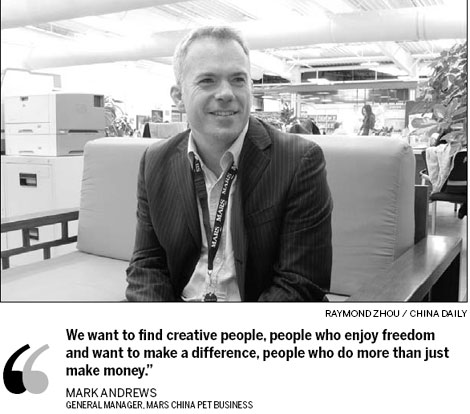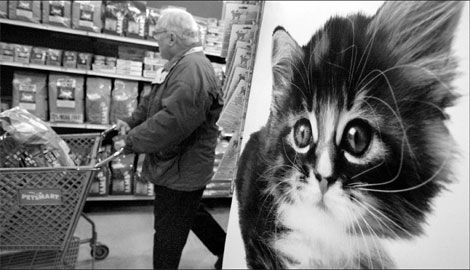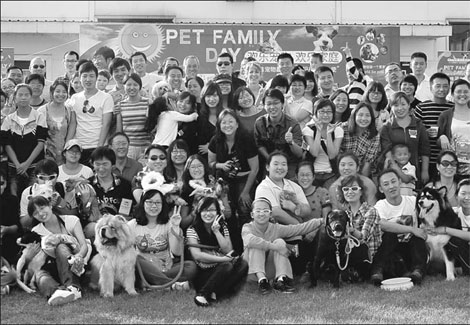Man with a passion for pet food

General manager believes that a society that loves pets is much better
BEIJING - China has 60 million pet cats and dogs. The sheer scale of pet ownership astounded Mark Andrews when he first arrived in the Middle Kingdom in August 2009, but when the general manager for the pet business of Mars China thinks about it in terms of the country's human population, he becomes convinced that the number of pets would only increase.
That portends well for Mars, the company behind Whiskas cat food, Pedigree dog food, Cesar dog food, Chappi dog food and KiteKat cat food, among others. Some of these brands go back 80 years.
Andrews has noticed a few interesting differences about his consumers - the pets in China - and their relationship with their owners. For example, cats are very close to their owners and tend to stay at home while the owners go to work.
In the United Kingdom, where he joined Mars Pet UK in 2001, a cat may have two owners, slipping in and out of pet doors without each owner finding out.
Chinese owners love their pets just like those in other countries, Andrews says, but their kinship is often manifested in a blind conviction that their way is the best. While in Western countries as much as 70 percent of the food consumed by pets come from companies such as Mars, Chinese pet owners prefer to cook for their pets, with only 3 percent of owners feeding them with prepared pet food.
The problem is, "human food isn't the most nutritious for cats or dogs", says Andrews.
According to research, only 40 percent of a human meal is digested by pets, with the remainder just wasted. With specially designed pet food, the ratio goes up to 84 percent.
That also addresses the concern of cost. Once you factor in the nutrition, "our product is value for money". And that has not taken into account the comparative cost of cooking for pets, such as the time and ingredients.
"The biggest barrier is nutritional awareness," Andrews says. That means reaching out to potential customers and educating them about the nutritional facts of pet food against home-cooked food. When looking at general food safety issues, pet owners will have more incentive to at least try out the new way of feeding their animal friends.
Growing market
Mark Andrews has been following news stories that involve pets in China.
He is heartened by what he read over the past year, especially stories such as the rescue of a truckload of dogs on the way to being slaughtered as food for restaurants. While he recognizes those dogs are not pet dogs and just bred for food, he thinks it "fantastic that society as a whole is embracing the importance of pets".
Andrews sees feeding pets as part of a complex human-pet relationship. "We are not just in the business of selling pet food," he says, but "want to have a positive impact on the society in which we do business". He believes that a society that loves pets is much better for humans as well.
In a society like China, where word of mouth is often the most powerful tool of communication, Mars often sets up stalls in apartment complexes and sends experts to promote scientific knowledge.
They have found that people who just bought a puppy are the "most demanding because they are hungry for knowledge", while those who have owned pets for a long time prove to be more resistant to different ways of feeding.
Responsibility
The community outreach programs have also discovered that pet ownership in China is "slightly skewed toward an older profile". Pet owners tend to have children and tend to live in slightly bigger buildings, which, Andrews adds, is the same around the world. Also, the more developed a city is, the higher the use of pet food. Currently, Mars is in 60 of the top cities in China but, Andrews predicts, this number will shoot up to 300 over the next few years.
Mars will differentiate and treat every province and every city separately, he says. "China is too big in geography. Every city and region must have a different sales strategy and operational method," which will be more complicated to operate, but necessary.
A higher rate of pet ownership will eventually benefit Mars, but Mars does not take a "the more the better" approach. Instead, the first piece of advice Andrews and his staff will offer a potential pet owner is responsibility: "Fundamentally, you should own a dog or a cat only when you are ready to own the dog or cat for life."
That is a big commitment for anyone, but it is part of the responsible pet ownership policy the company advocates. "When you see your pet as a part of your family and not something like an accessory - in the same way as your car or your handbag or your watch might be - that is when responsibility just becomes natural," says Andrews.
Pets that do not go to responsible households do not lead a happy life, he says. That is especially relevant to dogs, which can be dangerous if not trained well. When a dog does not behave, it is the fault of its owner, he says. "People need to be taught how to bring a dog up in the right way, just like a child or yourself."
All Mars people share the same vision of creating a better world for pets. Andrews envisages a growing population of responsible pet owners, which will drive the industry of pet care and pet food. More pets will receive the full treatment of good hygiene, healthy food, prim-and-proper dress and other care issues. As the whole industry grows, Mars will grow with it.
Role model
Mars is not only a manufacturer of products for pets, but aims to set a positive example for pet-human relations in the workplace. While some high-tech companies tout the employee perk of bringing their pets to work, Mars has built a pet-friendly environment that will bring a big smile to any pet lover as soon as he or she steps into its corporate building.
In the Huairou office complex of its China headquarters, in Beijing's northern suburbs, beautiful pictures of employees with their pets line the walls. There is a large dog pen outdoors attached to the building, looking like a small kindergarten. On the second floor is a play area for cats.
Incidentally, the whole office area is not partitioned, except for the cat playroom, with most employees sitting at round tables. Even the general manager does not get a private room. The only "preferential treatment", if it can be so called, is a traditional Chinese screen to his back, and behind that, the vista of the western hills of Beijing, where, on a clear day, you can spot the contours of the Great Wall snaking among them.
At Mars, employees can bring their pets to work every day, says the approachable and engaging general manager.
|
A customer shops for cat food as he passes a photo of a kitten in a supermarket in Niles, Illinois. Tim Boyle / For China Daily |
He recounts the tale of one employee who has rescued many stray dogs and cats and taken them home to care for them.
Mars also organizes an annual event, a corporate party so to speak, for all employees, some with friends, to gather in early autumn on the lawn with their pets. Even colleagues from the chocolate business of the company down the road will come. They exchange tips on pet care just like mothers talking about their babies.
That, according to Andrews, not only boosts employee morale, but also creates a ripple effect that gradually influences a wider circle of society with positive pet-caring habits.
The absence of an office-space hierarchy may trickle down to the way people treat their pets or, conversely, it could be inspired by positive pet-human relations in the first place. "We put a lot of trust in people. We tend to find people who respect that trust and that freedom," says Andrews.
You do not have to be a pet owner to join the company, but if you do not like pets you will probably stay away, he says - or, if you take a special interest in a hierarchical way of operation, for that matter. "We want to find creative people, people who enjoy freedom and want to make a difference, people who do more than just make money."
The passion of Andrews for the pet food business makes it as sexy and appealing as an ambitious start-up in the IT industry, and that is very unusual for a company with a rich history, founded by Frank Mars exactly 100 years ago, in 1911.
China Daily
|
Pet owners with their dogs get together for a pet family day in rural Beijing. Provided to China Daily |
(China Daily 12/08/2011 page14)














